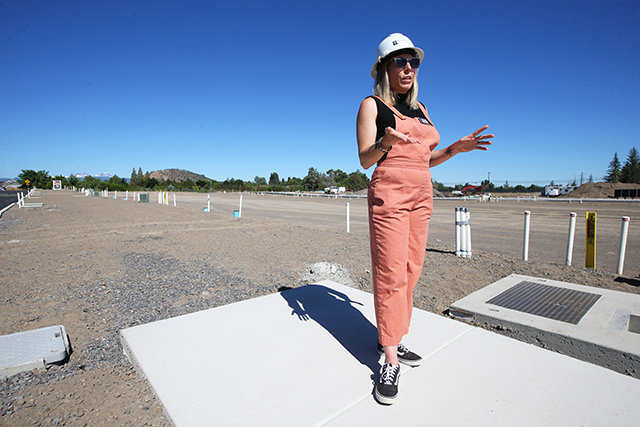Denying communion: A priest and a lesbian set off a Catholic clash
Published 5:00 am Monday, March 19, 2012
The moment was fleeting.
Barbara Johnson reached out to receive Holy Communion at her mother’s funeral Mass last month at St. John Neumann church in Gaithersburg, Md. The Rev. Marcel Guarnizo, standing before her, placed his hand over the offering bowl, denying her the sacrament.
Trending
Those mere seconds between Johnson, no ordinary Catholic, and Guarnizo, no ordinary priest, have touched off a heated controversy among Catholics across the country — another battle of dogmas in the seemingly endless cultural wars that have invaded nearly every corner of daily life, even funerals.
Conservatives have accused Johnson, an openly gay woman, of promoting a liberal political agenda at her mother’s funeral, of all places. The Washington archdiocese has accused Guarnizo, a Russian-ordained traditionalist with powerful friends, of intimidating parish staff after the incident and has suspended him from his priestly duties. He, in turn, has essentially accused church officials of lying.
What’s clear, amid all the dissension, is that distinctly different beliefs about Catholicism turned a random meeting of a grieving woman and priest into a theological collision.
Their roots are similar: Both Johnson, 51, and Guarnizo, 42, grew up in the Washington suburbs, come from devout Catholic families and attended Catholic schools.
But Johnson is also a Buddhist who supports gay marriage and other progressive causes. Guarnizo, by contrast, once signed an elaborate document denouncing Catholic politicians who support “morally repugnant” ideas such as gay marriage, and was known as a particularly intimidating protester in weekly demonstrations outside a Germantown, Md., abortion clinic.
Johnson is an arts educator who travels through liberal circles. Guarnizo, with the help of ex-World Bank and State Department officials, travels through Europe promoting free markets via conservative religious values.
Trending
And there they stood one morning in February, facing each other in the holiest of moments, inside a church with parishioners so devout that they hold prayer vigils there 24 hours a day.
To Johnson’s family, turning her away from Communion was “disgusting” and violated their view that a Catholic’s relationship with God is a personal matter, not one that can be determined at a glance by a priest. (The archdiocese, in fact, apologized for the “lack of pastoral sensitivity” she encountered.)
To Guarnizo, however, denying Johnson the sacramental bread and wine was “the only thing a faithful Catholic priest could do,” he said in a statement last week, given church teaching on homosexuality and his view of much-debated canon law governing who is eligible to take confession.
The seeds of their collision date back to 2007, when Johnson’s parents joined St. John Neumann because it was near their new home. Though the family showed up at Sunday Mass sparingly, mostly because of the parents’ advancing ages, they were devout Catholics, with priests visiting their homes and counted among their closest friends. When Barbara Johnson’s father, Theodore “Dick” Johnson, died in 2008, the funeral was held at St. John Neumann. She and her longtime partner attended together, and Johnson took Communion without incident.
Guarnizo, thin and wiry, with slicked-back black hair, arrived at St. John Neumann in 2011 after a priestly career spent mostly on the other side of the Atlantic.
It was a homecoming of sorts. His father still lives in Northern Virginia, where Guarnizo grew up.
He set out to make the church his life, studying theology at the Pontifical University of the Holy Cross, one of the many Vatican-affiliated schools in Rome. Holy Cross is associated with Opus Dei, a conservative movement made prominent by Dan Brown’s best-seller “The DaVinci Code,” but the group says Guarnizo is not a member.
The Rev. Robert Gahl, a philosophy professor at Holy Cross who worked with Guarnizo, remembered him as a “polyglot,” a brilliant student fluent in Italian and other languages who stuck out for his enthusiasm for big ideas.
“He was especially interested in the fact that the church preaches a gospel of liberation and freedom, and he felt that implies certain forms of governance in society that respect people’s freedom,” Gahl said.
Guarnizo developed an empathy for the plight of Catholics in Russia, where many people abhor Catholicism. Guarnizo wanted to help rebuild the church after the fall of communism, once telling an interviewer that he felt a “strong call” to assist. He was ordained there in 1998, one of the first priests anointed in the country in decades.
“He wanted to be a priest for Russia,” said Archbishop Tadeusz Kondrusiewicz, who ordained Guarnizo when he led the church in Russia. “It was his will.”
While Guarnizo was hopscotching around Europe giving speeches, Johnson was back home in Washington, wrestling with her own Catholicism, which had waxed and waned through her life as she confronted truths about her own sexuality. In the last decade, Johnson had returned to her alma mater, Elizabeth Seton High School in Bladensburg, Md., to teach art, a move she said was part of a process of coming back to Catholicism on her own terms.
But it was also an unsettling time. Her parents were aging and were connected to an unfamiliar church, one they were too infirm to even visit. Johnson and her three siblings, spread around the region, didn’t know the parish, its culture or its members. Nor did they know its pastor, the Rev. Thomas LaHood, who last month in a church bulletin compared gay marriage to slavery.
What’s next for Guarnizo is unclear. In his statement, he questioned the Washington archdiocese’s handling of the case and its allegations of his intimidation. Some Catholic commentators noted how unusual it is for a priest to publicly contradict and criticize his superiors. Doctrine dictates that priests are to be submissive to their bishops.
“If I was Cardinal Wuerl, I’d buy him a one-way ticket to Moscow,” said the Rev. Thomas Reese, a Washington Jesuit and former editor of the prominent liberal Catholic magazine America. “These days, arch-conservative priests feel much more comfortable attacking their bishops than do liberals because they feel they’ll get support from conservative Catholic blogs and maybe some in the Vatican.”
While Guarnizo has been fiercely attacked by liberal Catholics and non-Catholics, conservative Catholics have rushed to defend his decision to deny Johnson Communion. That Johnson ultimately received the sacrament from a lay minister that day hardly seems to matter at this point.








